The rich heritage and versatile cuisine of Karnataka in South India is as striking as any other regional cuisine of India. With an abundance of tasty dishes both in vegetarian and non-vegetarian, you will definitely miss onto something if you are not trying out this food culture. Some of the classic picks include Neer Dosa, Mysore Masala Dosa, Mysore Pak and the Bisi Bele Bath. In this post, I have shared an authentic Karnataka style Bisi Bele Bath Recipe, which is a deliciously complete meal of rice, lentils and veggies.
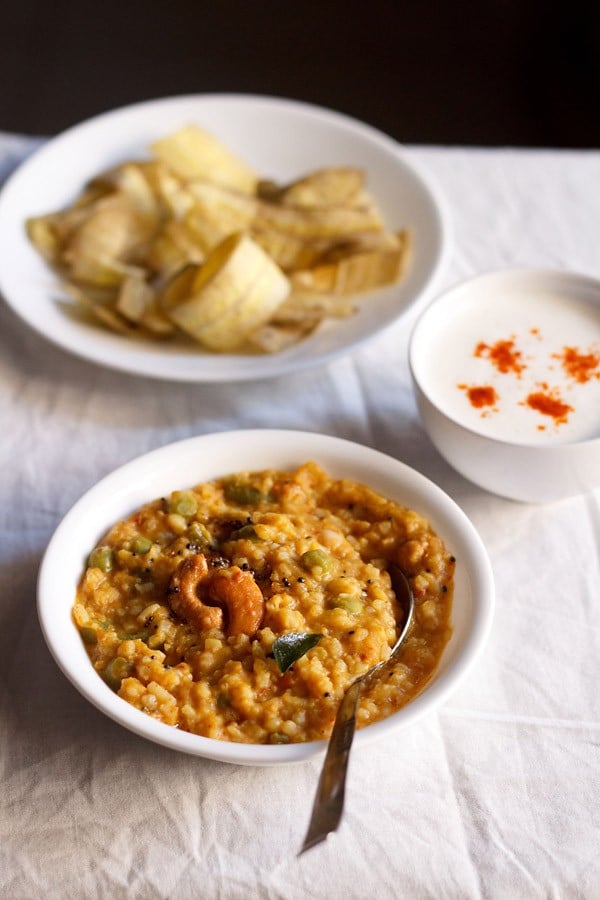
What is Bisi Bele Bath
Also known as Bisi Bele Huliyanna, Bisi Bele Bath is essentially a spicy dish made with rice, lentils and vegetables that is tempered with typical South Indian spices and nuts. A special spice blend called the Bisi Bele Bath powder is also added to it, which gives it the authentic taste.
If you break down the words, in Kannada language, ‘Bisi’ means hot, ‘Bele’ refers to lentils and ‘Bath’ means rice. Hence these three Kannada terms literally mean – Hot Lentil Rice.
The first time I tried the traditional Bisi Bele Bath was at an MTR eatery in Bengaluru (earlier Bangalore), Karnataka. This was also because my husband had recommended it as this unique dish is one of his favorite. And to be honest, even I fell in love with this specialty, in the very first bite.
Along with the unique masala powder and the Marathi moggu (kapok buds) that goes in the tempering, the Bisi Bele Bath Recipe also has tamarind which contributes to the dish’s distinctiveness. Sometimes, a personalized or customized recipe of this dish may also have about 30 ingredients!
Since the typical spice mixture is an integral part of the Bisi Bele Bath Recipe, you should have it handy at home. The best thing to do is to use the homemade blend versus a readymade one from the market. For this reason, you can refer to this easy DIY Bisi Bele Bath Powder recipe of mine.
Making the Bisi Bele Bath Recipe is a long process. You have to cook the rice, lentil and the veggies separately and then mix everything. Well, it’s not just mixing where you stop. There is definitely more.
About This Bisi Bele Bath Recipe
The Bisi Bele Bath is so popular that you easily get it in almost all South Indian restaurants in Karnataka as well as outside this state. Whilst living in Bengaluru too, it was a must for us to order a portion of this wholesome dish whenever we would visit an MTR chain of restaurants.
Since then, the dish literally grew on me. So much that I had to learn and share its recipe on my blog too. I happened to discover Pratibha’s Blog, from where I have loosely adapted my Bisi Bele Bath Recipe too.
The flavors make all the difference, which essentially comes from the Bisi Bele Bath Powder and the tempering towards the end. This special masala mix gives a lot of depth and flavor to the dish on the whole.
As I have mentioned earlier, it is apt to use your own homemade batch of this spice blend. Just in case you can’t, then go for a good quality store-bought one.
Also, you can cook the dal first. Then, add the rice, vegetables in it and cook them together in the pressure cooker. Sometimes, I do it this way too, to cut down on the time and steps. In this post, I have shown the traditional way of cooking everything separately.
The veggies that can be added in this recipe are carrots, turnips, green peas, brinjal (eggplant or aubergine), French beans, kohlrabi (ganth gobi), capsicum (green bell pepper), chayote squash (chow chow). I have added some of these in my recipe. You can also add your own choice of vegetables.
How to make Bisi Bele Bath
I have divided the entire recipe into 4 steps for ease of understanding and making.
- Step 1 – Cooking rice
- Step 2 – Cooking lentils and vegetables
- Step 4 – Making Bisi Bele Bath
- Step 4 – Tempering Bisi Bele Bath
Cook Rice
1. Rinse 1 cup rice and ¼ cup raw peanuts first. Another option is too skip the peanuts at this step and fry them in the tempering and then add.
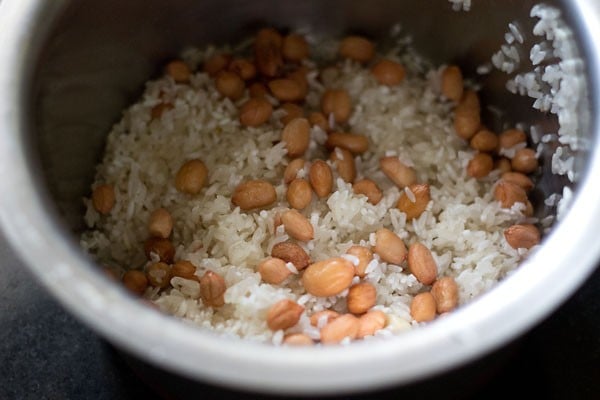
2. Add 2.5 cups water.
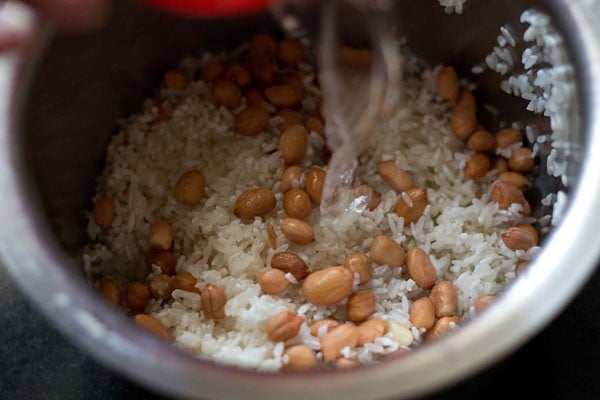
3. Soak both rice and peanuts for 20 to 25 minutes in the water.
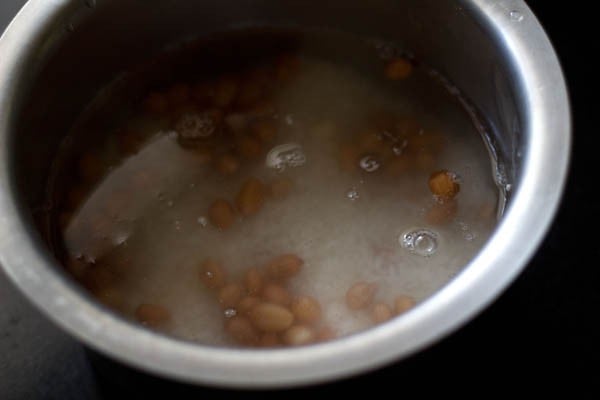
4. Add ¼ teaspoon edible rock salt or regular salt. Keep on the stovetop and cook the rice. No need to cover the pan with the lid.
While I have cooked the rice in a pan, feel free to cook in a stovetop pressure cooker (add 2 cups water) or the Instant Pot (add 1.5 to 2 cups of water).
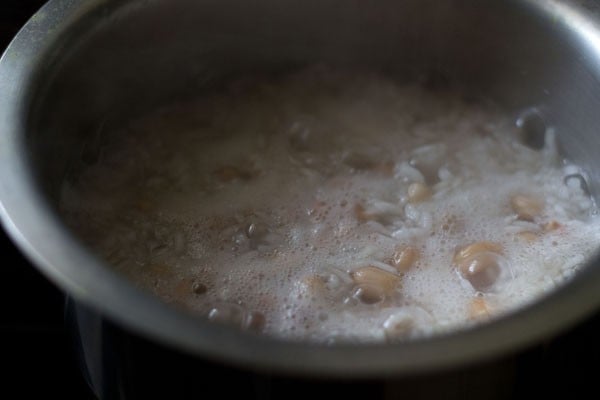
5. Simmer till the rice grains are tender and cooked well. The peanuts will also cook nicely. Cover and set aside.
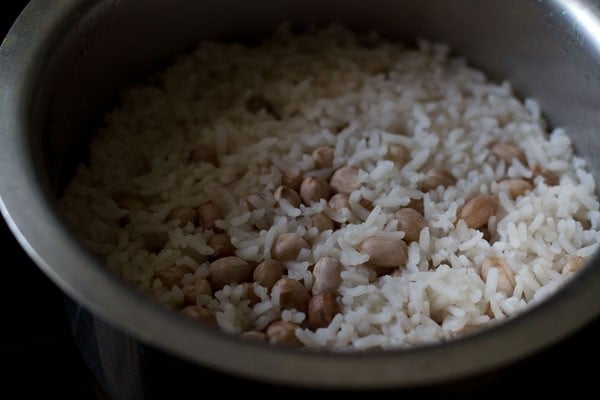
Cook Lentils and Vegetables
6. Soak 1 tablespoon tightly packed tamarind in ½ or ⅔ cup warm water for 25 to 30 minutes.
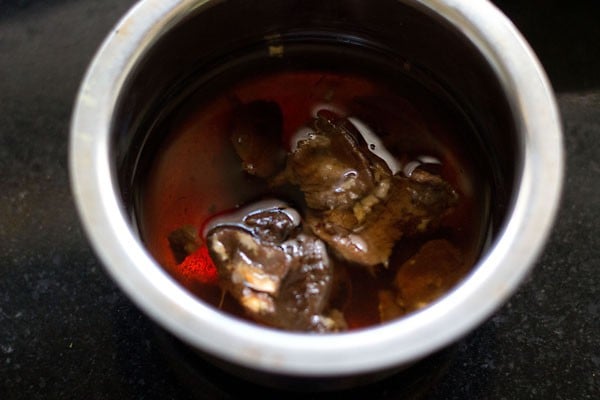
7. Later squeeze and extract the tamarind pulp in the soaked water. Strain and keep aside.
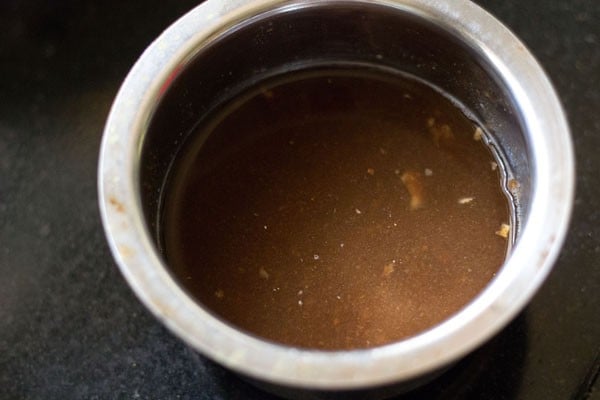
8. In a 3 litre stovetop pressure cooker, add ¾ cup rinsed pigeon pea lentils (tuvar dal), ½ teaspoon turmeric powder and 2 cups water.
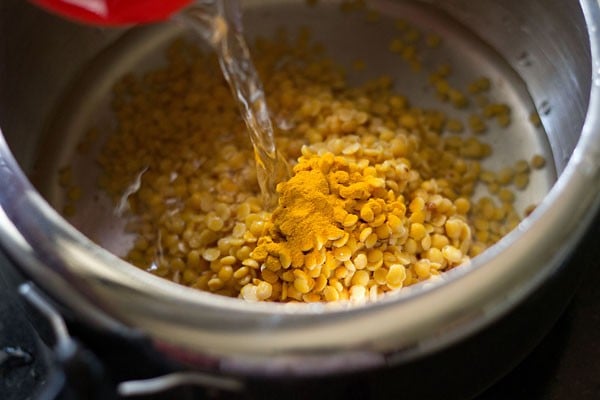
9. Pressure cook the lentils on high heat for 8 to 9 whistles.
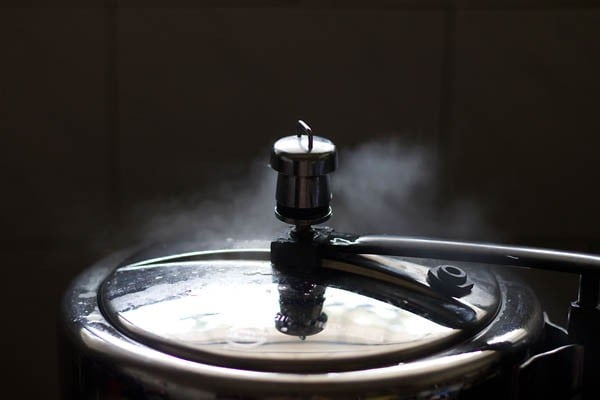
10. Once the pressure settles down naturally on its own in the cooker, then only open the lid. Mash the lentils with a spoon or whisk and set aside.
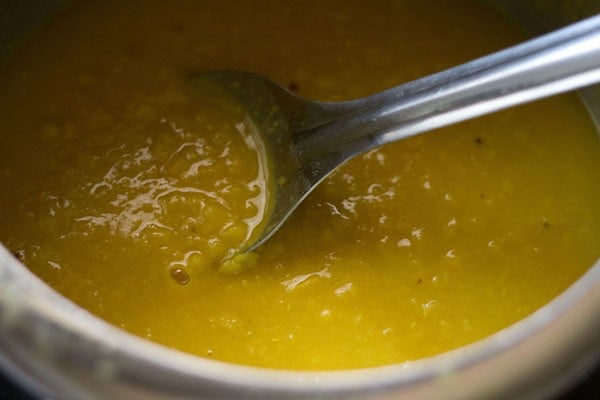
11. In another pan, take the chopped vegetables and sprinkle ¼ teaspoon edible rock salt or regular salt.
The vegetables I have added are:
- 1 medium-sized carrot, chopped
- 18 to 20 french beans, chopped
- ½ cup green peas – fresh or frozen
- 3 to 4 small brinjals or baby brinjals (small eggplants), chopped
- 1 medium-sized onion or 2 to 3 shallots, chopped
- 1 medium-sized tomato, chopped
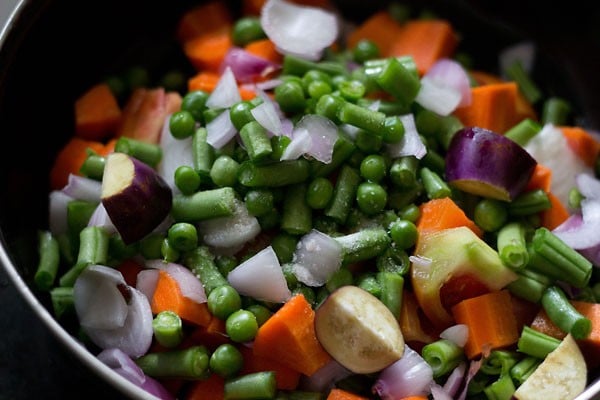
12. Pour 2 cups water and stir to combine.
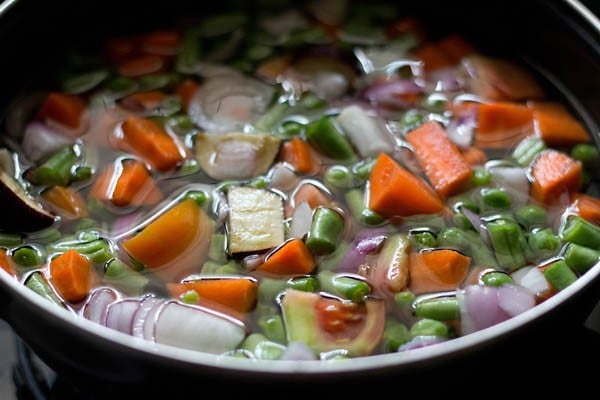
13. Cover pan with lid and cook the vegetables till fork tender and cooked well, yet still retaining their shape.
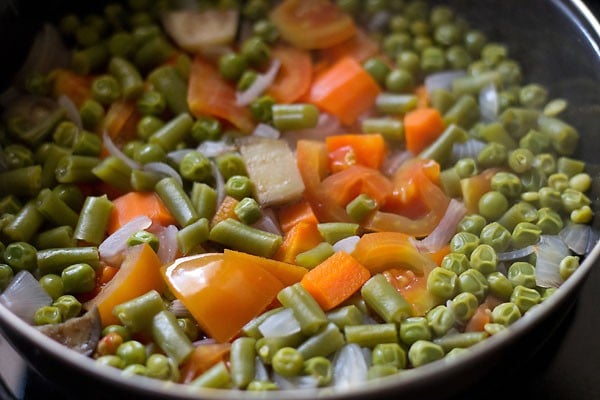
Make Bisi Bele Bath
14. Now, in the cooker with the mashed lentils, add the cooked rice and peanuts.
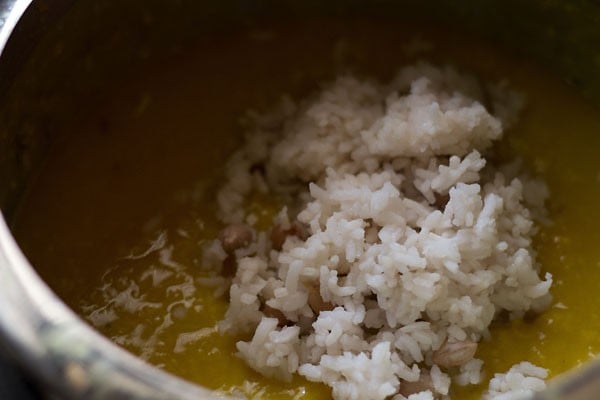
15. Then, add the cooked vegetables together with the stock.
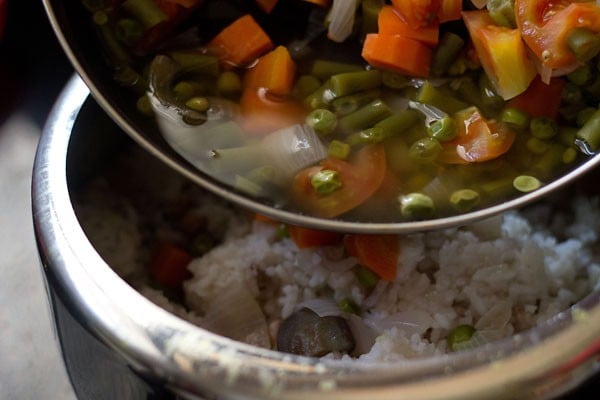
16. Stir lightly.
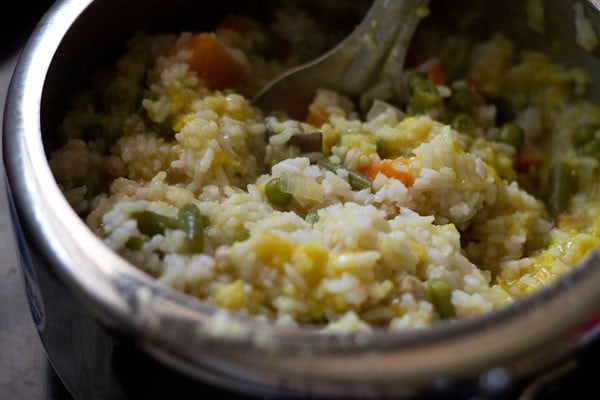
17. Add 1 cup water or as needed.
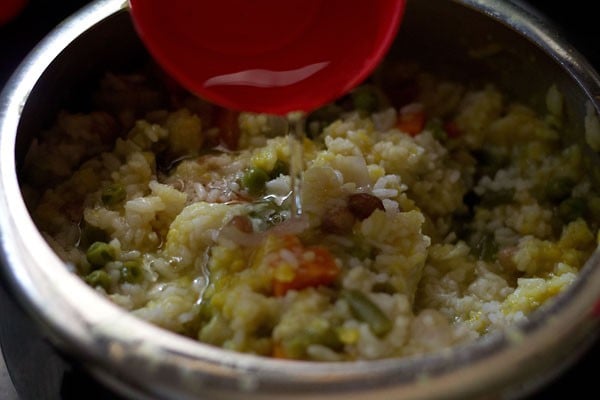
18. Add the prepared tamarind pulp.
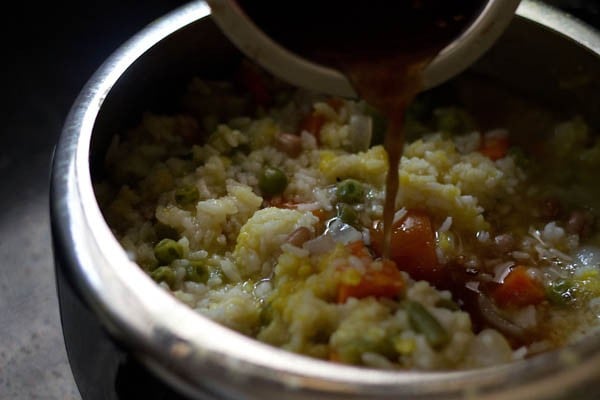
19. Mix everything gently, taking care the rice grains do not break.
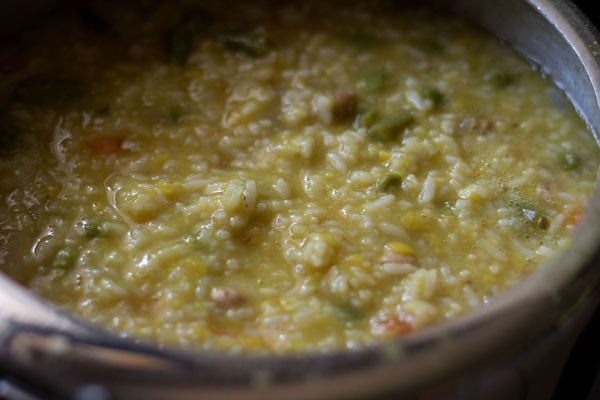
20. Now, in another pan or bowl, take 3 tablespoons Bisi Bele Bath masala and 1 cup water.
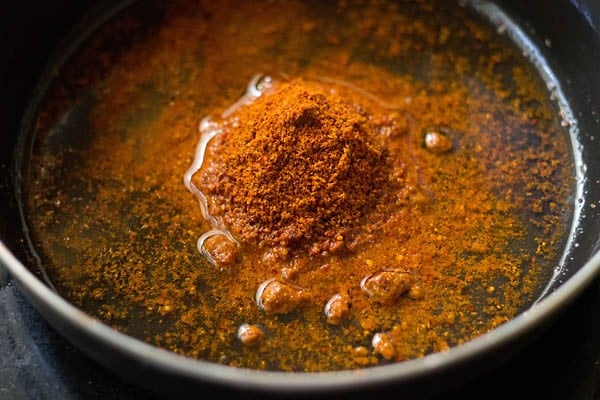
21. Stir and mix very well. The masala tends to stick to the back of the spoon while stirring, so scrape it off and add to the mixture.
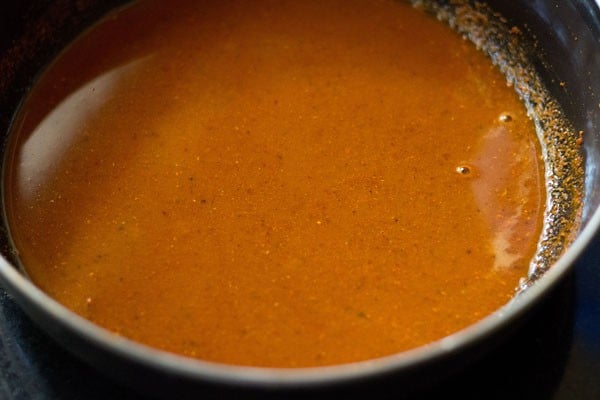
22. Now add this Bisi Bele Bath masala solution into the cooker filled with the cooked rice, lentils and vegetables.
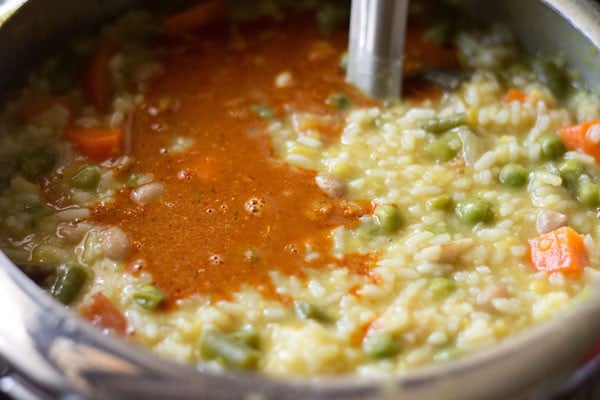
23. Add 2 tablespoons unsweetened desiccated coconut.
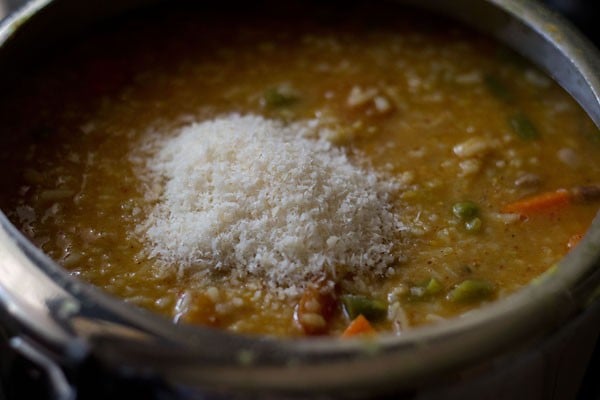
24. Stir and mix well. Also, add salt as required, keeping in mind that we have added salt to the vegetables and rice too.
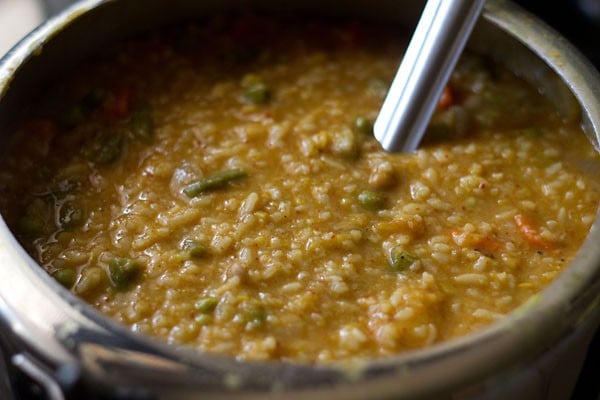
25. Keep the cooker without the lid on the stovetop and simmer on low heat for about 15 to 20 minutes. Add more water, if required.
Stir often so that the Bisi Bele Bath does not burn at the base. The raw aroma of the tamarind has to go away and the flavors should be blended well. Cover and keep aside, once done.
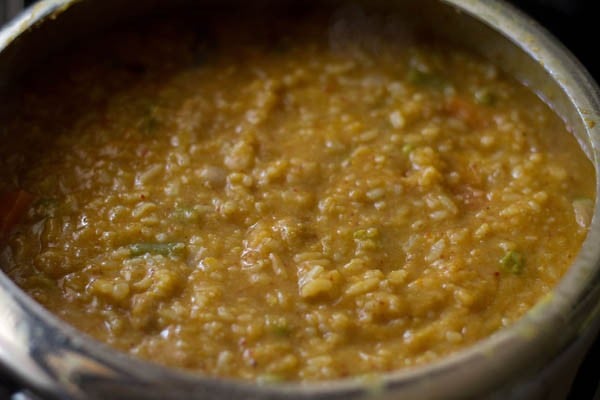
Temper Bisi Bele Bath
26. In a small tempering (tadka) pan, heat 3 to 4 tablespoons ghee or oil. Crackle 1 teaspoon mustard seeds first.
Then, fry 12 to 15 curry leaves, 1 to 2 Marathi moggu, 2 to 3 dried red chilies (seeds removed), 18 to 20 cashews and ¼ teaspoon asafoetida (hing).
Fry until the dry red chilies change color and the cashews turn a light golden.
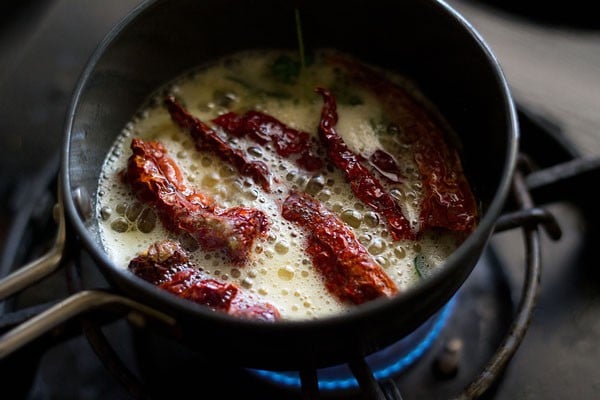
27. Immediately pour this tempering mixture together with the oil in the prepared Bisi Bele Bath and stir.
Cover the cooker with the lid for about 5 minutes, so that the tempering flavors infuse in the bath.
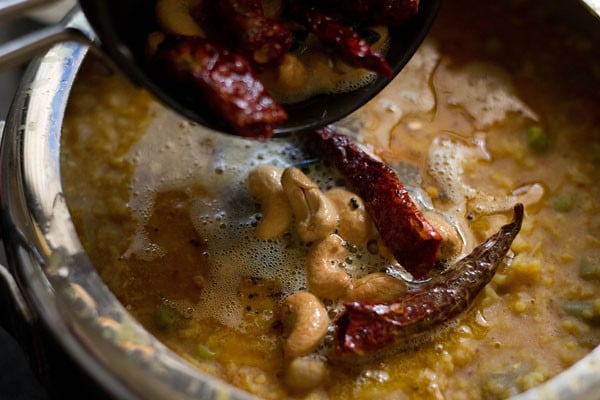
28. Serve Bisi Bele Bath with potato chips, banana chips/wafers or fried papads and raita or yogurt. If you prefer, top with a bit of ghee, while serving.
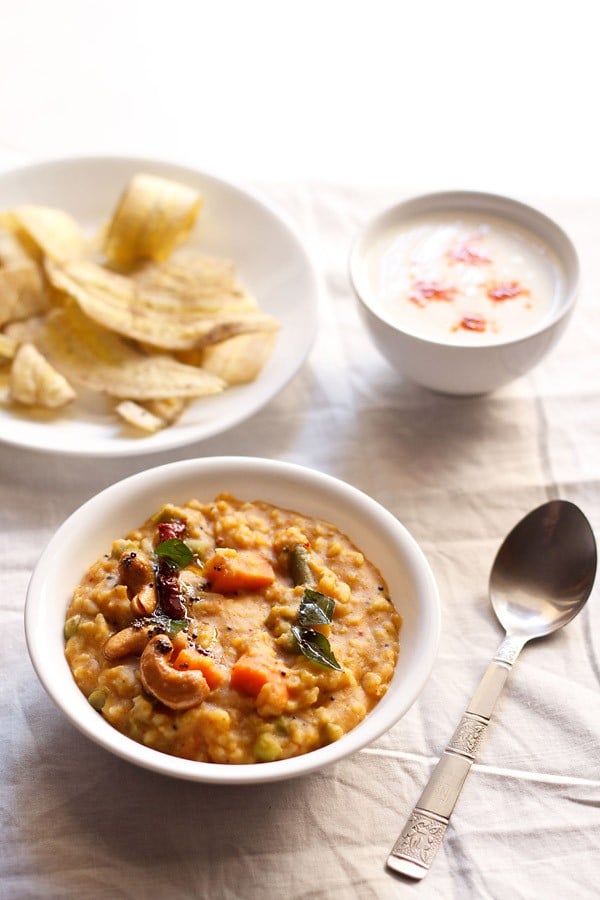
Expert Tips for Bisi Bele Bath
- The Marathi moggu or kapok buds are a must in the Bisi Bele Bath Masala mixture. So, if you are making your homemade batch of this spice blend and can’t find the spice in your local market, order online. However, it is optional in the tempering of the dish. So, you can skip it there.
- If you don’t want to add the raw peanuts with the rice in the beginning, then skip doing that. Instead, fry them in the tempering and then add.
- Ensure cooking the bisi bele bath till the raw flavor of the tamarind goes away and the flavors blend well. while cooking, add water and keep stirring so that it does not burn at the base.
- In order to make the flavors of the tempering infuse well in the bath, cover the cooker and keep it for about 5 minutes after stirring in the tempering.
- You can always adjust the consistency according to your preferences, but do not make it thin.
More Rice Recipes To Try!
Rice Recipes
Rice Recipes
Karnataka Recipes
South Indian Food Recipes
Please be sure to rate the recipe in the recipe card or leave a comment below if you have made it. For more vegetarian inspirations, Sign Up for my emails or follow me on Instagram, Youtube, Facebook, Pinterest or Twitter.
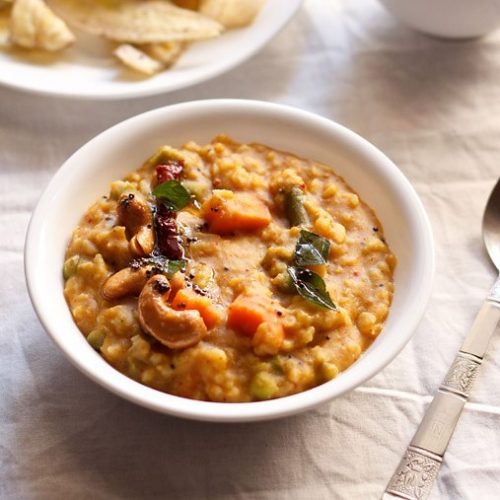
Bisi Bele Bath Recipe (Karnataka Style)
Ingredients
For cooking rice
- 1 cup rice (I used sona masuri rice)
- ¼ cup peanuts – raw
- ¼ teaspoon rock salt (edible and food grade) or regular salt, add as required
- 2.5 cups water – for cooking the rice in a pan
For cooking lentils
- ¾ cup tur dal (tuvar dal or pigeon pea lentils)
- ½ teaspoon turmeric powder
- 2 cups water – for cooking lentils in a stovetop pressure cooker
For cooking vegetables
- 1 carrot – medium-sized, 100 to 120 grams
- 18 to 20 french beans – 80 to 100 grams
- ½ cup green peas – 60 to 70 grams, fresh or frozen
- 3 to 4 brinjals – small sized eggplants, 80 to 100 grams
- 1 onion – medium-sized, or 2 to 3 shallots, 80 to 100 grams
- 1 tomato – medium-sized, 80 to 100 grams
- 1 tablespoon tamarind (tightly packed) soaked in ½ or ⅔ cup warm water
- 2 to 2.5 cups water – for cooking the vegetables
- 1 cup water – to be added later, add as needed
- 3 tablespoons Bisi Bele Bath Powder mixed in 1 cup water
- ¼ teaspoon rock salt (edible and food grade) or regular salt, for cooking the vegetables
- 1 teaspoon rock salt (edible and food grade) or regular salt, added later or add as required
- 2 tablespoons desiccated coconut – unsweetened
For tempering
- 3 to 4 tablespoon Ghee or oil
- 1 or 2 marathi moggu (kapok buds), optional
- 1 teaspoon mustard seeds
- 2 to 3 byadagi chillies or dry kashmiri red chillies or dry red chilies
- 12 to 15 curry leaves
- ¼ teaspoon asafoetida (hing)
- 18 to 20 cashews
Instructions
Cooking rice
- Rinse the rice and peanuts a couple of times in water. Take them in a pan and pour 2.5 cups water over them.
- Soak both rice and peanuts for 20 to 25 mins. Later add the salt.
- Keep the pan the stovetop and cook the rice on medium to medium-high heat.
- If required, then you can add some more water while cooking the rice.
- Bring to a boil and then lower the heat. Simmer till the rice grains are tender and cooked well and all the water has been absorbed. The peanuts would also cook well. Cover and set aside.
Cooking lentils and veggies
- Soak 1 tablespoon tightly packed tamarind in ½ or ⅔ cup warm water for 25 to 30 mins.
- Later squeeze and extract the tamarind pulp in the soaked water. Strain and set aside.
- In a pressure cooker, add rinsed tur dal, turmeric powder and 2 to 2.5 cups water.
- Pressure cook for 8 to 9 whistles on medium heat or until the dal is cooked soft and mushy.
- Once the pressure drops on its own in the cooker, then only open the lid. Mash the dal with a spoon and set aside.
- In another pan, take all the chopped veggies and ¼ teaspoon salt. Pour 2 cups water and stir to combine.
- Cover and allow the veggies to cook till they are fork tender but still retain their shape.
Making bisi bele bath
- Now in the cooker containing the mashed dal, add the cooked rice and peanuts.
- Then add the cooked vegetables along with its stock. Stir lightly to mix.
- Add 1 cup water. Add the prepared tamarind pulp. Mix everything well taking care the rice grains do not break.
- Now in another pan or bowl, take the 3 tablespoons of the bisi bele bath masala and 1 cup water.
- Stir to mix very well. The masala tends to stick to the back of the spoon while stirring, so scrape it off and add to the mixture.
- Now add this bisi bele bath powder and water mixture in the cooker.
- Add desiccated coconut. Add 1 teaspoon salt or as required. Stir and mix.
- Keep the cooker without the lid on the stove top and simmer on a low heat for about 15 to 20 mins. Add more water if required.
- Keep on stirring often. The raw aroma of the tamarind has to go away and all the flavors should be blended well. Cover and set aside once done.
Tempering bisi bele bath
- In a another pan or the tadka (tempering) pan, heat ghee or oil first. Crackle the mustard seeds and then temper the curry leaves, marathi moggu, dry red chilies, cashews and asafoetida till the dry red chilies change color and the cashews turn a light golden. Don’t burn the spices.
- Pour this tempering in the prepared bisi bele bath. Stir and cover the cooker with its lid for about 5 mins, so that the tempering flavors infuse in the bisi bele bath.
- Later serve the bisi bele bath with potato wafers or banana chips/wafers or fried or roasted papads. While serving you can top with some ghee if you prefer.
Notes
- Use any good variety of short-grained or medium-grained rice.
- For the lentils, preferably use unpolished tur dal.
- You can adjust the spices and seasonings as required.
- To balance the spicy and tangy flavors, you could add about 1 to 2 teaspoon of jaggery.
- Omit the cashews if you do not have them.
- Instead of ghee you can use oil.
- Opt to add vegetables like carrots, turnips, green peas, french beans, kohlrabi, capsicum (green bell pepper), chayote squash (chow chow), cauliflower, broccoli.
- Instead of cooking rice and peanuts in a pan, you can cook them in a stovetop pressure cooker (add 2 cups water) or the Instant Pot (add 1.5 to 2 cups of water).
Nutrition Info (Approximate Values)
This Bisi Bele Bath Recipe recipe from the archives first published in May 2014 has been updated and republished on January 2023.
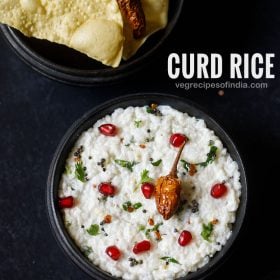
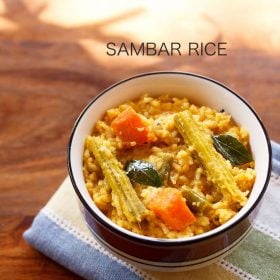
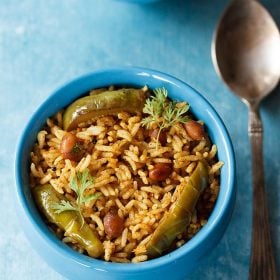
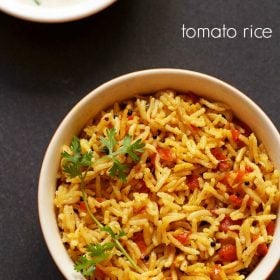
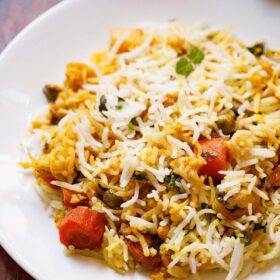
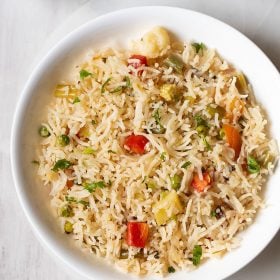
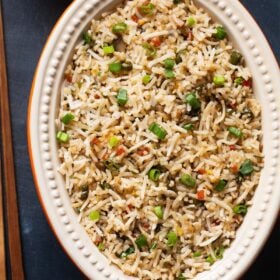
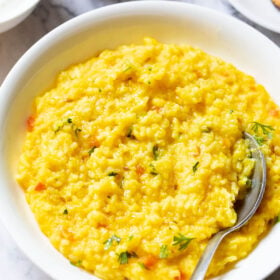








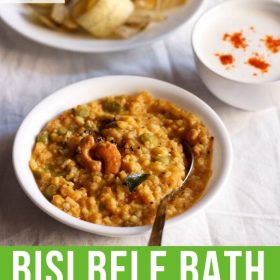
Hi Dasana,
I tried bisibele bhath recipe, it turned out super awesome. Thank you for the amazing recipe. You are a ????.
hi malvika, thanks a lot for this awesome feedback. glad to read. thanks again and most welcome.
what is marathi moggu?
marathi mogu is a spice and are known as kapok buds in english.
Hi Guys,
I was using your android app previously, i was wonderful. But recent past i dont find it plystore, would greate if you share us the link.
Thanks Sunil. We have deleted the app as we could not manage it well. You have to rely on this website for recipes.
Wow that’s a great one, thank you so much for sharing,my husband loves it.i made the powder from your post, that is wonderful.keep up the good work.
thanks again gokilavani. nice to know that the bisi bele bath powder recipe was good.